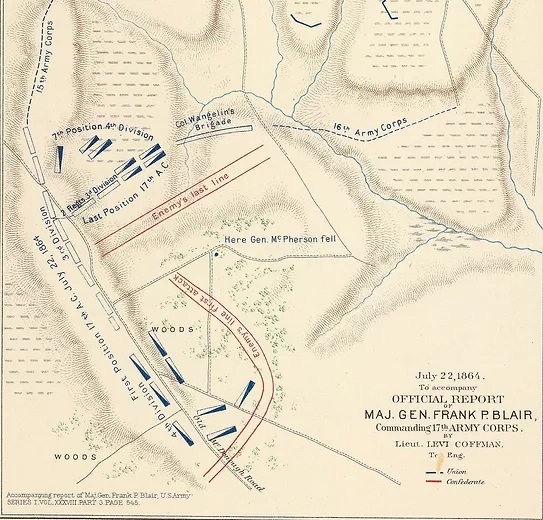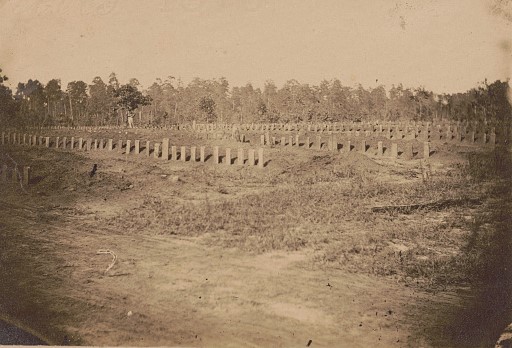A Roundtrip Ticket to Andersonville
On July 22, 1864, the 3rd Iowa Infantry found themselves nearly surrounded by Confederate troops from General Patrick’s Cleburne’s division in the opening thrusts of the Battle of Atlanta. The Iowans had been ordered up that morning as part of Colonel Benjamin Potts’ brigade of General Giles Smith’s Fourth Division of the 17th Corps. “We had hardly got started before the bullets came whizzing around us, but we continued to advance until we found that the Rebels had got in our rear and all around us,” Private James Maggart recalled. “Our colors were taken along with 111 men, the color bearer being shot in seven places and the captain commanding the regiment was killed. The boys retreated back to their rifle pits, some in one regiment, some in another. We number about 60 men.”
Among the men captured that morning was Corporal Daniel M. Mabie of Co. K.
Mabie, a frequent correspondent of the Cedar Falls Gazette, arrived at
Andersonville a week after his capture and kept a diary of his experiences.
Amazingly, Mabie only stayed about seven weeks at Andersonville as he was exchanged along
with 750 others on September 19th and returned to his regiment then
camped around Atlanta. “I can say that all of our boys who went to the prison
left there in good health [Mabie is referring only to his comrades in Co. K] and
will fight harder and labor with more energy than even before to avenge the
suffering of the last two months,” he wrote. “Tongue nor pen can describe it;
it is not in the language to do it.”
Upon his return to the regiment, Corporal Mabie provided a copy of his diary to the editors of the Cedar Falls Gazette who published this extract in their October 14, 1864, edition.
July 22: Charles Boehmler, Edward Bohmler, Henry King, Henry Rosco, Daniel Mabie, and James Daniels (he having been wounded and left at a house near the battlefield) were taken prisoners by Cleburne’s division and marched into Atlanta and thence to East Point, a distance of six miles.
July 23: Laid in the pen all day. Drew rations. One hard bread and an ounce of bacon for a day. Joined by some more prisoners. The guards have treated us very well with the exception of taking our hats and canteens if they were good ones. We are guarded by the 34th and 45th Tennessee and 54th Virginia. If we fare no worse we will be thankful.
July 24: Lay in the pen yet. Drew rations again- 2-1/2 hard breads for three days. They are made of peas and very moldy and rotten at that. Our bread is sweet cake compared with these. We still have a little coffee left, but it is precious. Orders to march in the morning.
July 25: Marched at 6 o’clock. Passed through several small stations and camped near Jonesboro in a sheep pen. Only one man at a time can go for water.
July 26: Moved at 7 o’clock. The old men, women, and children from all parts of the country came to see the Yankees pass. They thought all of Sherman’s army was coming. They seemed very jubilant over the capture. Plenty of fruit and vegetables but we cannot get any for love or money. They even refuse to let us have water. Citizens have to look our hereafter. Camped on a small creek and had a chance to wash and clean ourselves. Got a few apples at one dollar a dozen and some small biscuits at 25 cents apiece.
July 27: Marched at 7 o’clock. Road lined on both sides the same as yesterday. The boys have a fine time singing our patriotic songs to the discomfiture of the guards who try to stop them. Arrived at Griffin about 10 o’clock. Quite a nice place of some 3,000 inhabitants. Streets crowded with people, looks like a Fourth of July. Here I traded off my pocketbook for three hard breads. All of our trinkets such as knives, combs, etc. go like hot cakes. Paid $20 Confederate money for a watermelon that could be bought at home for ten or fifteen cents. Could not buy any bread. Here about one half of the squad got on the cars to go to Macon; the balance camped about a mile from town. Drew rations of cornbread and bacon which were good. Paid $3 for a pie and $1 for three cookies. Rained in the evening and we got a nice soaking but we are tough and can stand it.
July 28: Captain Anderson, who had charge of us, impressed an express train and we got aboard and started for Macon. Cars broke down and we had to lay over until 9 in the evening when we went on, arriving in Macon about 11 at night.
July 29: Arrived at Andersonville. They took our case knives and everything else that they found and wanted- letters, newspapers, etc. At about 2 o’clock we entered the stockade which was to be our home for some time. There was many a long face as we passed up the only street and saw the suffering that free American citizens were enduring in that hell on earth. Just think of it: 32,960 men occupying 17 acres of ground with a deadline which takes out two acres, and a creek or swamp that takes out two more, leaving 13 acres of ground. They have no shelter except such as they can make with their blankets as they have to stay out in the scorching sun and soaking rain. In the evening we drew rations of a small piece of cornbread about two inches square and nine spoons of molasses- no meat. We found Ed Shields and a number of our regiment here who were taken last winter. They look very well but have seen some hard times. They gave us a good deal of advice which was very acceptable and a great help.
July 30: Paid $3 for poles enough to put up four blankets for a shade. We have a very good place. There are twelve of us under it. The rations that they issue are cornbread, rice, beans or meal, and bacon, beef, or molasses. We receive but two things at once. Now then a little salt. Three sticks of four-foot wood for 270 men, scarcely enough to make a cup of coffee.
July 31: Took a walk through the camp. The sight made me shudder. Saw them bring in a load of bread for us and take out a load of dead. They threw them into the wagon as you would wood, showing no respect either for the living or the dead. They are dying here very rapidly at the rate of 50-100 per day, the principal diseases being scurvy and dysentery there being no contagious diseases here which is very encouraging.
August 1: No excitement here. Beginning to feel reconciled to our situation going upon the principle that it is no use to cry over spilt milk.
August 2: 450 of Stoneman’s cavalry came in, he a prisoner. They report heavy fighting on the 28th at Atlanta. The Rebs have completely stripped them, taking everything from blankets, boots, hats, and all.
August 3: 600 more cavalry. They came in the same as the others, some with nothing but drawers and shirts on. What will they do if they remain long in this hell as you might say. Some rumors about exchange.
August 22: One month ago today we were captured and what we have seen and passed through will never be blotted from our memories. Everything has been quiet so far and we are yet all well and hearty.
August 26: They say that there is to be an exchange and they have called for the commissioned officers who have passed themselves off as privates.
August 31: This is the last day of summer. This month has been very sickly, men having died at the rate of 140 per day or 4,340 during the month. This includes the hospital.
September 5: Atlanta reported taken. Great excitement in camp. Ordered the men to quit work upon the barracks as the state of Georgia has gone up.
September 6: 18 detachments of 270 men ordered out in the morning, they say for a general exchange. Many a man who has not been able to move for a month can now hobble some distance and the faces of all look brighter than ever. It will be a blessing to all and especially to those who have been here 12-15 months.
September 12: H. King, J. Baker, and J. Daniels went out today with the 20th and 23rd detachments. They were very jubilant at the prospect of being once more in the land of the living.
September 17: We are at last out of the pen and are enjoying the pure fresh air of heaven.
September 19: We are exchanged and upon a train bound for Atlanta. The spirits of the men are so high that they cannot keep from cheering everybody and everything.
September 20: They issued us double rations last night and today we expect to get clothing. We need it bad for we have had no soap or chance to wash.
September 21: Arrived at our regiment.
The boys are all very glad to see us, but no more so than we to see them. We
have not drawn any clothing yet but will today. We find that all of our letters
have been returned so we have to wait some time to hear from our friends.
Sources:
Letter from Private James M.
Maggart, Co. K, 3rd Iowa Volunteer Infantry, Cedar Falls Gazette
(Iowa), August 19, 1864, pg. 1
Letter from Corporal Daniel M.
Mabie, Co. K, 3rd Iowa Volunteer Infantry, Cedar Falls Gazette
(Iowa), September 30, 1864, pg. 2
Diary of Corporal Daniel M.
Mabie, Co. K, 3rd Iowa Volunteer Infantry, Cedar Falls Gazette
(Iowa), October 14, 1864, pg. 1














Comments
Post a Comment